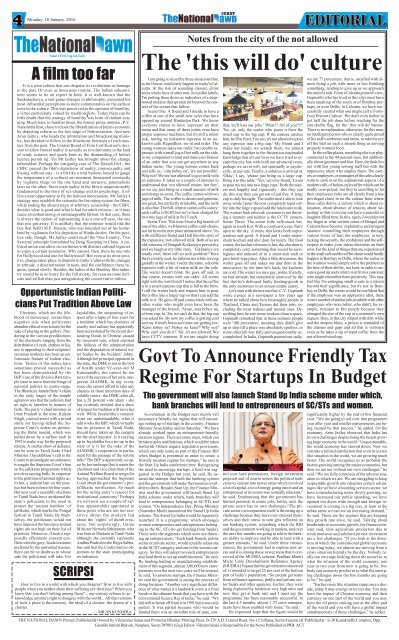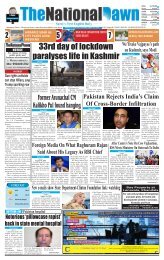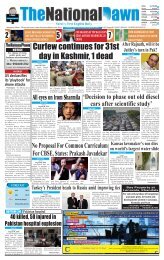You also want an ePaper? Increase the reach of your titles
YUMPU automatically turns print PDFs into web optimized ePapers that Google loves.
Monday, <strong>18</strong> <strong>January</strong>, <strong>2016</strong><br />
Notes from the city of the not allowed<br />
A film too far<br />
It is a wise culture that can disguise its revolutions as homage<br />
to the past. Or even as innocuous routine. The Indian subcontinent<br />
seems to be an expert in both. It is well-known that the<br />
Sankaracharya, a real game-changer in philosophy, presented his<br />
most influential perceptions as mere commentaries on the earliest<br />
texts in the culture. This was perceived as the epitome of humility,<br />
a virtue particularly valued by traditionalists. Today there can be<br />
little doubt that the strategy of humility was born of radiant cunning.<br />
Much later, in familiar times, the former prime minister, P.V.<br />
Narasimha Rao, chose to cloak the liberalization of India's economy<br />
by depicting reform as the last stage of Nehruvianism. And now<br />
Arun Jaitley, who heads the information and broadcasting ministry,<br />
has decided to follow in the illustrious footsteps of such masters<br />
from the past. The Central Board of Film Certification's decision<br />
to allow frontal nudity is actually as revolutionary in the land<br />
of ready scissors and quick bans as the dismantling of India's<br />
licence permit raj. Yet Mr Jaitley has brought about the change<br />
unheralded. Perhaps the intriguing case of The Danish Girl - the<br />
CBFC passed the film's depictions of nudity, transsexuality and<br />
kissing without cuts - is a bit like a trial balloon loosed to gauge<br />
the temperature of a cultural environment threatened constantly<br />
by vigilante thugs on the one hand and intrusive, paternalistic<br />
laws on the other. Since male nudity in the film is unquestionably<br />
fundamental to the story of sex-change and its psychology, it offers<br />
a neat opportunity to fly the balloon innocuously. Mr Jaitley's<br />
strategy may establish the rationale for the rating system for films,<br />
while ending the absurd reign of arbitrary censorship - the CBFC<br />
decides what is good and what is bad for adult citizens - or it may<br />
cause an embarrassing or unmanageable fallout. In that case, there<br />
is always the option of representing it as a one-off case, the one<br />
that just got away. It is unlikely that the minister would risk the<br />
fate that befell M.F. Husain, who was hounded out of his homeland<br />
by vigilantes for his depiction of Hindu deities. On the positive<br />
side, though, Mr Jaitley could recall the 'One Country, Two<br />
Systems' principle formulated by Deng Xiaoping in China. A political<br />
union can allow its territories with distinct cultural legacies<br />
to enjoy a certain autonomy. Why cannot, then, there be one rule<br />
for Hollywood and one for Bollywood? But even at its most positive,<br />
change takes place in droplets in India. Cultural shifts, changes<br />
in attitude, a discrimination in taste, and the confidence these require,<br />
spread slowly. Besides, the ladies of the Bombay film industry<br />
would be in no hurry for the full monty, for reasons more delicate<br />
and selfish than just antagonizing the conservative milieu.<br />
Opportunistic Indian Politicians<br />
Put Tradition Above Law<br />
Elections, which are the lifeblood<br />
of democracy, reveal their<br />
negative side when politicians<br />
abandon ethical convictions for the<br />
sake of playing to the gallery. Pandering<br />
to the various predilections<br />
of the electorate ranging from the<br />
distribution of cash, clothes or liquor<br />
to appealing to their religious/<br />
sectarian instincts has been an unfortunate<br />
feature of Indian elections.<br />
Tactics of this nature have<br />
sometimes proved successful as<br />
has been demonstrated by the<br />
BJP’s use of the divisive Ram temple<br />
issue to move from the fringe of<br />
national politics to centre-stage.<br />
The Bharatiya Janata Party’s claim<br />
in the early stages of the temple<br />
agitation was that the judiciary had<br />
no right to interfere in matters of<br />
faith. The party’s chief minister in<br />
Uttar Pradesh at the time, Kalyan<br />
Singh, courted arrest with a proud<br />
smile for having defied the Supreme<br />
Court’s orders on protecting<br />
the Babri masjid, which was<br />
pulled down by a saffron mob in<br />
1992 to make way for the proposed<br />
temple. A similar show of defiance<br />
can be seen in Tamil Nadu Chief<br />
Minister J Jayalalithaa’s call to the<br />
Centre to promulgate an ordinance<br />
to negate the Supreme Court’s ban<br />
on the jallikattu programme which<br />
involves taming bulls. In response<br />
to the petitions of animal rights activists,<br />
a judicial ban on the practice<br />
has been in force for four years.<br />
But next year’s assembly elections<br />
in Tamil Nadu have awakened the<br />
state’s politicians to the need to<br />
protect the ‘ancient tradition’ of<br />
jallikattu, which marks the Pongal<br />
festival in Tamil Nadu. By themselves,<br />
the politicians would not<br />
have imposed the ban since animal<br />
rights are not high on their list of<br />
priorities. Moreover, if such a supposedly<br />
effeminate concept conflicts<br />
with the gory, feudal customs<br />
preferred by the unwashed masses,<br />
there can be no doubt as to whose<br />
side the politicians will take. For<br />
SCRIPSI<br />
Jayalalitha, the outpouring of respect<br />
after a lapse of four years for<br />
a tradition which has elements of<br />
cruelty and sadism has apparently<br />
been necessitated by the recent devastating<br />
floods in Chennai caused<br />
by incessant rain, which exposed<br />
the failures of the administration<br />
and the degradation of natural water<br />
bodies by the builders’ lobby.<br />
Although her principal opponent in<br />
the state, the DMK is not in the best<br />
of health under 92-year-old M<br />
Karunanidhi, she cannot be too<br />
sure of the success of her own, oneperson<br />
AIADMK. In any event,<br />
since she cannot afford to take any<br />
chances in these uncertain days of<br />
volatile voters - the DMK, after all,<br />
has a 28 percent vote share - she<br />
has evidently decided that a show<br />
of respect for tradition will serve her<br />
well. While Jayalalitha’s compulsions<br />
are understandable, what is<br />
odd is why the BJP, which virtually<br />
has no presence in Tamil Nadu,<br />
should have taken up the cudgels<br />
for the chief minister. Is it cozying<br />
up to Jayalalitha for a tie-up in the<br />
state or is it for the sake of the<br />
AIADMK’s cooperation in parliament<br />
for the passage of the reform<br />
bills? The BJP is apparently so upset<br />
by her umbrage that it wants the<br />
chairman and vice-chairman of the<br />
Animal Welfare Board to resign for<br />
having approached the Supreme<br />
Court about the government’s pro-<br />
Jallikattu notification. So much<br />
for the ruling party’s respect for<br />
institutional autonomy! Perhaps<br />
we will now see a couple of saffron<br />
apparatchiki appointed to<br />
these posts who are not too sensitive<br />
about the modern fad<br />
about the ‘rights’ of dumb creatures.<br />
Not surprisingly, Union<br />
Minister Nirmala Sitharaman, who<br />
was born in Madurai in Tamil Nadu<br />
although she currently represents<br />
Andhra Pradesh in the Rajya Sabha,<br />
has said that the Centre had no objections<br />
to the state promulgating<br />
an ordinance.<br />
How to live in a world with which you disagree? How to live with<br />
people when you neither share their suffering nor their joys? When you<br />
know that you don't belong among them?... our century refuses to acknowledge<br />
anyone's right to disagree with the world... All that remains<br />
of such a place is the memory, the ideal of a cloister, the dream of a<br />
cloister.<br />
- MILAN KUNDERA<br />
The 'this will do' culture<br />
I am going to describe three situations that,<br />
as far I know, could only happen in today's Calcutta.<br />
At the risk of sounding classist, elitist<br />
and a whole host of other non- hoi polloi labels,<br />
I'm putting these down as indicators of a deeprooted<br />
malaise that spreads far beyond the context<br />
of the scenes that follow.<br />
Scene One: A friend and I decide to have a<br />
coffee at one of the small new cafes that have<br />
opened up around Hindustan Park. We know<br />
everyone claims to have 'espresso' on their<br />
menu and that many of these joints even have<br />
proper espresso machines, but it's still a minor<br />
risk, tasting an unknown espresso at an unknown<br />
café. Regardless, we sit and order. The<br />
young waitress takes our order: two double espressos<br />
with a small jug of hot milk on the side,<br />
to my companion's mind and mine a no-brainer<br />
of an order that you can get anywhere in any<br />
Indian metro. The young woman comes back<br />
and tells us, ' oita hobey na', 'it's not possible'.<br />
Why not? We are 'not allowed' to give milk with<br />
an espresso. It takes us a couple of minutes to<br />
understand that 'not allowed' means 'not free',<br />
so we say just bring us a small amount of milk<br />
and charge us extra. The coffee comes with two<br />
jugs of milk. The coffee is decent and genuine,<br />
not great, but perfectly drinkable, and the milk<br />
is also fine. The bill, when it comes, tells a story:<br />
each coffee is Rs 80, but we've been charged for<br />
two tiny jugs of milk at Rs15 each.<br />
Scene Two: This time I'm at a big branch of<br />
one of the older, well-known coffee-café-chains,<br />
not far from the new place mentioned above. I'm<br />
with a different friend and I tell him the story of<br />
the expensive, 'not-allowed' milk. Both of us are<br />
old veterans of Bangali/Kolkataiya perversity<br />
and we laugh at my little story. ' Eikhaaney ora<br />
totally cool, there will no such problem!' Here<br />
they're totally cool, he informs me while waving<br />
grandly at the waiter. I order the same, a double<br />
espresso with a bit of warm milk on the side.<br />
The waiter doesn't blink. He goes off and, in<br />
due course, returns with our order. All seems<br />
right with the world until I notice that the coffee<br />
is in a small espresso cup that is full to the brim.<br />
I call the waiter back and request him to pour<br />
the coffee into a larger cup so that I can add the<br />
milk to it. He goes off and comes back with another<br />
waiter who might even have been the<br />
manager of the branch. 'Syaar, otaa hobey na,<br />
oi boro cup- ta.' Sir, we can't do that, the big cup<br />
you asked for. By now my coffee is getting cold<br />
and my friend's brain and mine are getting hot.<br />
'Keno hobey na? Hobey na keno?' Why not?<br />
Why can't you do it?' 'Sir, it's not allowed. We<br />
have CCTV cameras. If we are caught doing<br />
we are 77 percenters, that is, satisfied with almost<br />
doing a job, with more or less finishing<br />
something, tending to give up as we approach<br />
the end of a task. From a Calcutta point-of-view,<br />
Gopinath (who has lived in this city) must have<br />
been speaking of the south or of Bombay perhaps,<br />
or even Delhi; in Calcutta, we have successfully<br />
created what one might call a 'Forty-<br />
Four Percent Culture'. We don't even bother to<br />
get half the job done before reaching for the<br />
eita cholbe flag, for the ' this will do' banner.<br />
There is no explanation, otherwise, for this man,<br />
an intelligent person who is clearly quite proud<br />
of his café's ambience and menu, to take his eye<br />
off the ball on such a simple thing as serving<br />
properly warmed food.<br />
In the coffee places, something else is at play,<br />
connected to the 44-percent-ness, but additionally<br />
about ignorance and fear. Here, the fault lies<br />
not with this young serving staff but with the<br />
oppressive idiots who employ them. The owners,<br />
or employers, or managers of the cafes clearly<br />
want to cash in on the aspirational aspects of a<br />
modern café, of Italian-style coffee which can be<br />
madly over-priced, but they're unwilling to let<br />
their employees (who are all clearly from a less<br />
privileged class) in on the culture from where<br />
these cafes derive, a culture which is about relaxation,<br />
about absence of tension, about 'adjusting'<br />
so that everyone can have a peaceful or<br />
laughter-filled time. In this, again, I would point<br />
my finger at what certain zones of Bengal and<br />
Calcutta have become: exploitative and arrogant<br />
'masters' controlling their employees through<br />
various levers of fear; the employees, in turn,<br />
lacking the security, the confidence and the selfrespect<br />
to make even micro-decisions on their<br />
own. For the kind of things that one experienced<br />
in the small café and the coffee-chain would hardly<br />
happen in Bombay or Delhi, where the waiter or<br />
the waitress would simply solve the problem to<br />
the best of their ability, not least in order to ensure<br />
a good tip and a return visit from a customer<br />
who might remember them positively. This may<br />
feel like I'm enlarging small events to a station<br />
beyond their significance, but it's not: in Bombay<br />
or Delhi, the waiter would be confident that<br />
if the employee was an oppressive idiot, there<br />
were a number of similar jobs available with other<br />
employees who were better, who didn't, for example,<br />
threaten to fire people because they<br />
changed the size of the cup at a customer's own<br />
request. Here, in this city striped with dirty white<br />
and the deepest blues, a person is reminded of<br />
the chasms and gaps and all that is verboten<br />
even as he takes a sip of tepid coffee from the<br />
not-allowed sized cup.<br />
Govt To Announce Friendly Tax<br />
Regime For Startups In Budget<br />
The government will also launch Stand Up India scheme under which,<br />
bank branches will lend to entrepreneurs of SC/STs and women.<br />
Government in the Budget next month will<br />
announce a friendly tax regime that will encourage<br />
setting up of startups in the country, Finance<br />
Minister Arun Jaitley said on Saturday. “We have<br />
already worked upon an entrepreneur-friendly<br />
taxation regime. There are some steps, which can<br />
be taken up by notifications, which would be taken<br />
forthwith. Others require legislative provisions,<br />
which can only come as part of the Finance Bill<br />
when Budget is presented in order to create a<br />
friendly taxation regime for startups,” he said at<br />
the Start Up India conference here. Recognising<br />
the need to encourage startups, a fund was suggested<br />
in the Budget last year, he said. He assured<br />
the startups that both the banking system<br />
and the government will make the resources available<br />
to them. Besides Start Up, the Finance Minister<br />
said the government will launch Stand Up<br />
India scheme under which, bank branches will<br />
lend to entrepreneurs belonging to SC/STs and<br />
women. “On Independence Day, Prime Minister<br />
(Narendra Modi) announced the Stand Up India<br />
scheme. The Stand Up India would be separately<br />
launched. It is a programme, which envisages<br />
women entrepreneurs and entrepreneurs belonging<br />
to the SC, STs (to get funding from banks).<br />
These were the segments which were not throwing<br />
up entrepreneurs. “Each bank branch, public<br />
sector or private sector, would actually adopt one<br />
in the SC/ST category and one in the women category.<br />
So they will adopt two such entrepreneurs<br />
and fund them to set up establishments,” he said.<br />
By funding trading or manufacturing establishment<br />
of this segment, almost 3,00,000 new entrepreneurs<br />
over the next two years will be created,<br />
he said. To promote startups, the Finance Minister<br />
said the government is easing the process of<br />
doing business. “Another very significant difference<br />
of what makes it a landmark event is a final<br />
break or the ultimate break that you have with the<br />
conventional licence Raj of India,” he said. “We<br />
did well to break off from it in 1991 but it was only<br />
partial. It was partial because who would be<br />
funded there was an invisible role of state, con-<br />
that, we'll lose our jobs.' 'What?? All of you???'<br />
'No, sir, only the waiter who pours it from the<br />
small cup to the big cup. If the camera catches<br />
him, he'll be fired. You see, it's not allowed to pour<br />
any espresso into a big cup.' My friend and I<br />
shake our heads, we scratch them, we almost<br />
bang them together in the frustration-marinaded<br />
knowledge that all our lives we have tried to escape<br />
this city but, with both our advanced years,<br />
perhaps we never will, not spiritually or psychically,<br />
at any rate. Finally, a solution is arrived at.<br />
'Okay,' I say, 'please just bring us a large cup.<br />
Bring it to this table.' 'Yes,' says my friend, 'I want<br />
to pour my tea into two large cups.' Both the waiters<br />
nod happily and vigorously - this they can<br />
do, this way they can get out of jail free. A large<br />
cup is duly brought. The uniformed t-shirts look<br />
away while I pour the now completely tepid coffee<br />
into the large cup and add the lukewarm milk.<br />
The waiters look relieved: customer is not throwing<br />
a tantrum and neither is the CCTV camera.<br />
Scene Three: The cutest little café-snack bar,<br />
again in south Kol. With a courtyard, even, that's<br />
open to the sky. A menu that looks both unpretentious<br />
and good. A friend and I order motorshutir<br />
kochuri and alur dom for lunch. The food<br />
comes, the kochuri element is hot, the alur dom is<br />
completely cold, something that would be sacrilegious<br />
and unheard of in a street-side stall or<br />
pice-hotel-type place. After a little discussion, the<br />
waiter goes off and nukes our alur dom in the<br />
microwave; by the time he's back, the kachoris<br />
are cold. The waiter is a nice guy, polite, friendly,<br />
no bad attitude, but completely unmoved by the<br />
fact that he's delivered faulty fooding-goods to<br />
the only customers in an almost empty eatery.<br />
Let's start with the last one first. C.Y. Gopinath<br />
wrote a piece in a newspaper a few years ago<br />
where he talked about how thoroughly people in<br />
Thailand, China and Taiwan did their jobs, including<br />
the most tedious and menial ones. Describing<br />
how he saw some workers clean a space,<br />
Gopinath remarked that in these cultures people<br />
were '100 percenters', meaning they didn't give<br />
up or stop till a place was absolutely spotless, or<br />
some other job was fully and unquestionably accomplished.<br />
In India, Gopinath pointed out sadly,<br />
trol over land permissions, foreign investment<br />
proposal and of course unless the political nods<br />
came to venture into newer areas which involved<br />
a lot of capital, a lot of energy going into it and an<br />
entrepreneur or investors was normally reluctant,”<br />
he said. Emphasising that the government has<br />
limited potential to create jobs, Jaitley said, the<br />
private sector has its own challenges.“The private<br />
sector own expansion itself is throwing up a<br />
challenge because they have over-stressed themselves<br />
and their stress in turn gets reflected on<br />
our banking system, something which the RBI<br />
and the government working in tandem, and over<br />
the next few months are going to add to the bankers<br />
ability to improve and be able to lend with a<br />
greater amounts,” he said. Under these circumstances,<br />
the government had to explore new areas<br />
and it is among those newer areas that it conceived<br />
of the MUDRA scheme. Pradhan Mantri<br />
Micro Units Development Refinance Agency<br />
(MUDRA) Yojana that the government conceived<br />
of, is intended to target 25 per cent of the bottom<br />
part of India’s population. “So people get loans<br />
from refinance agencies, public and private sector<br />
banks and other agencies. Earlier, they were<br />
being exploited by lenders at very high rates and<br />
now they get at bank rate and I must say the<br />
programme has been reasonably successful. In<br />
the last 4-5 months, almost 1.73 crore entrepreneurs<br />
have been enabled with loans,” he said.<br />
He expressed hope that the figure would be<br />
significantly higher by the end of this financial<br />
year. “We are going to roll over that programme<br />
year after year and smaller entrepreneurs are being<br />
created by that process,” he added. On the<br />
economy, Arun Jaitley observed that India has<br />
its own challenges despite being the fastest growing<br />
large economy in the world. “Unquestionably,<br />
the world economy has slowed down. Now we<br />
can take a limited satisfaction that even in a crisis<br />
like situation in the world, we are growing much<br />
faster. The world recognises us as probably the<br />
fastest growing among the major economies, but<br />
then we are not without our own challenges,” he<br />
said. “We are fully conscious of the adverse situation<br />
in which we are. We are struggling to keep<br />
respectable growth rate (despite) certain advantages<br />
like we have a booming services sector, we<br />
have a manufacturing sector slowly growing, we<br />
have increased our public spending, we have<br />
opened our doors wide enough and foreign investment<br />
is coming in a big way, at least in the<br />
urban areas we can see an increasing demand,”<br />
he said. These are the engines that are keeping<br />
this growth rate alive, he said. Talking about<br />
headwinds to economic growth, the finance minister<br />
said, slow agriculture production due to<br />
weak monsoon and subdued private investment<br />
are a few challenges. “If you look at the direction<br />
in which the conventional global economy<br />
is moving today, we almost are moving from a<br />
crisis situation literally by the day. Nobody really<br />
can envisage looking down the tunnel as to<br />
what the situation of the world economy, one<br />
year or two year from now is going to be. Nobody<br />
can seriously predict as to what the emerging<br />
challenges down the few months are going<br />
to be,” he said.<br />
“Earlier crisis like situation came once a decade,<br />
today it may emerge twice in a day. You may<br />
have the impact of Chinese economy and their<br />
currency on one part of the world and you may<br />
have the oil prices striking you at the other part<br />
of the world and you will have a global impact<br />
simultaneously of these challenges,” he added.<br />
THE NATIONAL DAWN Printed, Published & Owned by Vikramrao Sanas and Printed at Bhaskar Printing Press, B-129 A.B. Central Road, No-12 Udhana, Surat (Gujarat) & Published at - S-30 Kanaknidhi Complex, Opp.<br />
Gandihi Smruti Bhavan, Nanpura, Surat-395001 (Guj) Editor- Vikram Sanas is Responsible for the News Published in PRB. ACT

















